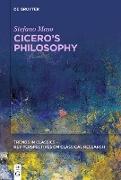Cicero's Philosophy
BücherAngebote / Angebote:
Cicero was not only a great politician, a lawyer and an orator: he wanted to deal with philosophy because he believed that philosophy constituted the sure ground on which to support his civil commitment. He did not limit himself to the translation of the philosophical thought proposed by the Hellenistic schools: he was able to critically address the theoretical questions and to present them again in the forms and the language typical of the Roman intelligence of the world.
This modern interpretation of Cicero makes use of the careful reading of what are considered his most explicitly philosophical works: De finibus bonorum et malorum, Tusculanae disputationes, De fato, De officiis, De amicitia, De senectute, Academica, De divinatione, De republica, De legibus.
It will be fundamental to grasp the critical approach of Cicero with respect to what he studies and learns: both with regard to the Epicureanism, but also towards Stoicism. It will be important to recognize the limits of his understanding of the thought of Plato and Aristotle.
Finally, advanced university students, postgraduate students and scholars of ancient philosophy will be able to use and appreciate this "guide" because it aims to overcome the boundaries between literature, linguistics and philosophical dimension.
Folgt in ca. 2-3 Arbeitstagen

